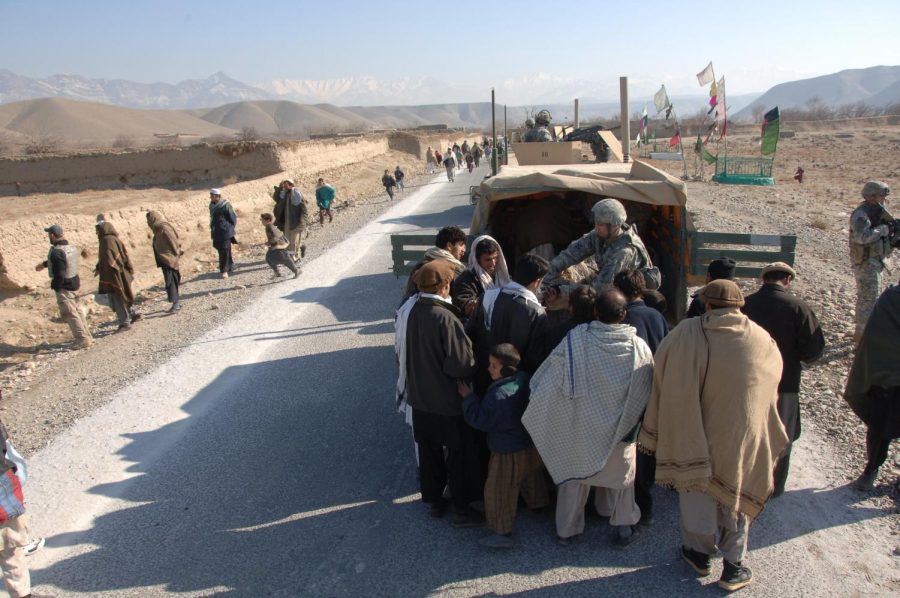Opinion | Don’t spend Afghanistan’s money
Photo courtesy of Staff Sgt. Tyffani L. Davis/The U.S. Army/Flickr
Local villagers receive humanitarian aid from the Bagram Provincial Reconstruction Team in Afghanistan in 2008. Senior columnist Eddie Ryan argues that President Biden’s misuse with the Afghan funds is not the right course of action.
Feb 25, 2022
Invoking 9/11 almost always gives presidents a political boost. George W. Bush’s approval ratings soared after the attacks as he assured the nation, grieving and fearful, that vengeance would be had. Successive presidents have drawn on 9/11’s unifying power to effect similar ratings bumps.
It’s no surprise, then, that President Biden’s decision to allocate Afghan reserve funds to families of 9/11 victims comes during a midterm year. If ever there was a time to scorn a cheap 9/11 mention — other than when it’s done to justify war — it’s now. But Biden will probably get away with it.
First, a few words on the war and withdrawal fiasco. Though similarly misconceived and ill-managed, the wars in Afghanistan and Iraq deserve slightly different legacies.
Since the Taliban sheltered Osama bin Laden, Afghanistan was partially linked to 9/11 — in contrast to Iraq. The invasion of Afghanistan and early months of combat were relatively successful. Had the coalition stopped then and had they not let bin Laden slip at Tora Bora, the clouded legacy of 20 near-fruitless years could have been dodged.
I also tend to wince when people say that Bush started a 20-year war in Afghanistan. He certainly launched the conflict in Iraq, but the war with al-Qaida and by extension the Taliban began on American soil on Sept. 11.
Get The Daily Illini in your inbox!
Don’t mistake this for support for Bush or the war or an unsavory quotient of patriotism; the war was a failure and its opponents were largely vindicated. It just never hurts to clean up imprecision in the winning arguments.
Despite whatever logistical feats the administration claimed for the withdrawal, that too was a failure. While the war’s end was a welcome sight for most Americans, it’s quite difficult to deny the U.S. let Afghans down.
Biden’s decision to follow political formulas rather than prioritize Afghan voices left thousands loyal to the U.S. vulnerable to Taliban retribution. Americans ought to remind themselves of the Afghans who clung to departing planes and fell to their deaths in desperation.
All this brings us to the item of interest: Biden’s appropriation of Afghan money. In early February, he issued an executive order to consolidate $7 billion of Afghan reserves held in New York City’s Federal Reserve Bank. Half the money is headed to a trust fund for Afghan humanitarian relief, with the rest as compensation for the victims’ families.
The administration has its reasons for doing this. It claims the money would otherwise remain tied up in the courts. And, in fairness to Biden, the U.S. is already supplying Afghanistan with hundreds of millions of dollars in aid.
Still, this move is grossly inappropriate. The $7 billion sum — the bulk of Afghanistan’s foreign currency reserves — isn’t really America’s to spend. It’s Afghanistan’s money. The issue is the lack of a clear legal proprietor, as the Taliban aren’t widely considered legitimate.
The U.S. remains wary of showing tacit approval for the Taliban. This fear is one that it eventually needs to get over for the sake of Afghans. Nevertheless, the order’s stipulation that the trust fund bypass the Taliban entirely is one of few positives.
And boy, is this relief needed. Afghanistan’s economy is in tatters. One million have fled into Iran and Pakistan, threatening a major refugee crisis; over half the population already faces serious food insecurity. The U.N. projected 97% of the country could fall below the poverty line by mid-2022.
Given these circumstances and the debt America owes Afghans, more American funds — let alone Afghanistan’s own money — should go to humanitarian aid. Where do the families of 9/11 victims enter the picture?
Curiously, they claim a legal right to the reserves. In a lawsuit known as the Havlish case, 150 relatives of 9/11 victims successfully sued the Taliban for judgment debts. They have persuaded Biden to use the reserves to meet those debts.
I don’t want to belittle the families’ reasonable claims to long-overdue compensation. Nevertheless, it shouldn’t be snatched from the hands of people who’ve themselves endured the Taliban’s villainy.
What’s more, it’s important to consider the moral implications of demanding the Taliban pay up. No shortage of countries could make the same request of America. Take Henry Kissinger alone: Chileans, Indonesians and Cambodians could come calling in droves for reparations for the atrocities committed against their countries under his watch.
Though the thought of such an uproar — and perhaps some war crimes trials — to close the door on his sordid life of crime is tantalizing, its unlikelihood illustrates the unevenness of the debate over 9/11 compensation.
The Biden presidency has indeed had its bright moments, even with some foreign policy failures. However, Biden’s misuse of Afghan funds is at best a bad action toward a decent end. At worst, it reeks of colonialism.
Eddie is a junior in LAS.






